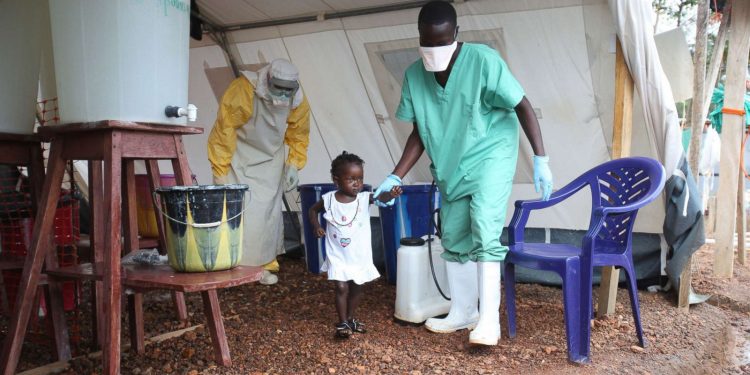EBOLA: A 46 year old woman who died in the Democratic Republic of Congo, was on Monday confirmed Ebola positive, confirming a new case and possible re-emergence of the dreadful Ebola virus in the country. This was made know by DR Congo’s health ministry just weeks after the end of a recent outbreak.
BASIC FACTS
- The Health Ministry the DR Congo Monday confirmed a new case of Ebola in it’s crisis ridden Kivu region.
- Congo DR have had repeated cases of Ebola virus.
- Ebola virus was first found in the Ebola river of the then Zaire (Now Congo DR) in 1975.
WHAT WE KNOW
The Democratic Republic of Congo has confirmed a new case of Ebola in its violence ridden Kivu region, east, of the East African nation that has been characterised by violence and political crisis.
This new case is coming weeks after the last Ebola crisis ended. The DR Congo, last month declared its latest Ebola outbreak over. This was over two months after the virus re-emergency in the northwestern Equateur province.
However, last week, the World Health Organization (WHO) announced DR Congo was investigating a suspected case.
The sample from a 46-year-old woman who died on August 15 in Beni city, North Kivu province, “tested positive” for Ebola, DR Congo’s health ministry said in a statement published late Monday.
It further stated that the tests showed the case is linked to a previous strain of the virus from 2018 and was not a new variant. Nonetheless, the ministry reassured the public that officials were “hard at work on the ground” to respond to the situation.
NOTABLE QUOTE
While trying to reassure the public that there was no need for panic, the health ministry of the DRC said in the statement:
“We like to reassure the public that officials are hard on the ground to respond to the situation”
FLASHBACK
The Ebola virus was first discovered in the Ebola river region of the then Zaire in 1976. The disease is named after the river. The Ebola virus was initially spread through fruit bats. It is also thought that this animal maybe it source and host.
Ebola is an often fatal viral haemorrhagic fever. Human transmission is through body fluids, with the main symptoms being fever, vomiting, bleeding and diarrhoea.
The virus first became a matter of concern to Nigerians in July 2014, when a Liberian who was infected came to Nigeria. The victim, Mr. Patrick Oliver Sawyer who was attending an ECOWAS event was then admitted at a Lagos hospital. The effort of the medical personnel at First Consultant helped to contain the spread of the disease.
Unfortunately, the disease claimed the life of Dr Stella Ameyo Adadevoh, who raised a red flag and indeed ensure Mr. Sawyer didn’t leave the hospital.
NEWS ANALYSIS
The consistent re-emergency of the Ebola virus should be of concern to public health officials in Africa and the world. Africa can’t afford the 2014 experience and even the COVID 19 lockdown experience, at least not in a hurry.
Back home, Clariform Newsdesk will use this opportunity to remember and salute the bravery of Dr. Stella Ameyo Adadevor who gave her life to curtail the spread of the disease in 2014.
Clariform Newsdesk also wish to remind those in government of the need to immortalise this heroine of our time.












